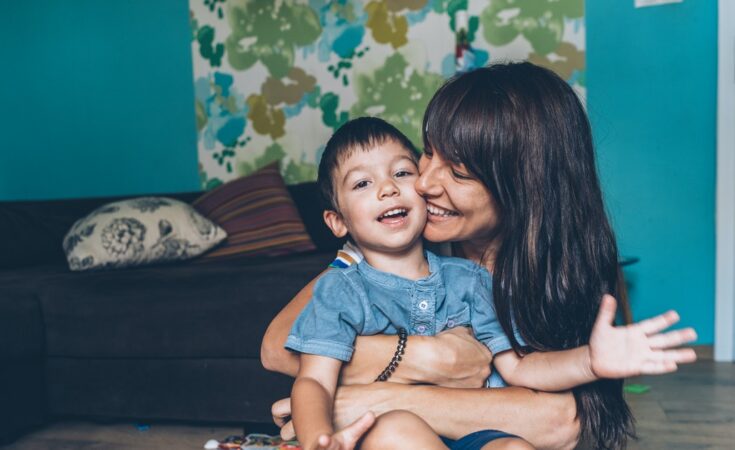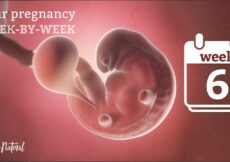It’s a tale so familiar it barely needs telling: I was young (I’d just turned 23), I married my high school sweetheart, I published a self-congratulating essay about how solid our marriage was (sigh), we fell apart. I filed for divorce in 2015, we remain friends, and so on.
Then, in late 2017, I gave birth to my son. A month prior, waddling hugely pregnant through the New York City courthouse, I’d married his dad, the extraordinary man I’d fallen in love with after my first marriage crumbled. (Hey, when you know, you know.) And now that son is a clever, sensitive, goofy, gap-toothed four-year-old who yearns to understand everything about everything.
“Is Earf the smallest planet?” And “Does whales have bellybuttons?” And “Why can’t I stick my tongue in my nose like a giraffe?” I do my best to answer these many questions (no, yes, and gross, respectively), but I’m quietly waiting on another: “Who’s that guy with you in the picture, Mom?”
It’s not that I’m embarrassed by my failed marriage — if anything, I’m glad for the natural conversation starter about the virtues of waiting and seeing. (“Son, in life there are small mistakes, and then there are big, costly, life-upending mistakes…”) But what concerns me about telling my kid about it when he’s still small is that he is by nature a worrier, and the knowledge that I was somebody else’s wife could ignite new anxieties: that I might someday stop loving his dad, or even him; that there’s a part of my life he can’t get his head around, and as a result I’m not as knowable to him as I was. Finally, I fear he’ll be forced too early to make the rattling cognitive leap that eventually comes for every kid, the process of realizing that our parents are actual, fallible people rather than the perfect protectors we’d always believed them to be.
To get some perspective on this divorcee’s dilemma, I turned to Eileen Kennedy-Moore, Ph.D., a Princeton, New Jersey psychologist and professor of the Wondrium course Raising Emotionally and Socially Healthy Kids. My first (admittedly absurd) question: Do I really need to tell him? Kennedy-Moore countered with a question of her own: “Is the child likely to find out at some point?” Well, yeah, probably. In addition to the boxes of old photos I have in the basement, the surname under which I write is that of my former husband, but in life I use my current husband’s name. So, at some point, looking at this or that book’s spine or byline, my child is sure to wonder who the hell Katie Arnold-Ratliff is. Kennedy-Moore continued, saying that if my son is bound to find out anyway, “it seems wise to share this information as early as possible, to avoid your child feeling like this is a terrible, shocking, and shameful secret that no one can speak of.”
Though the thought of dropping this truth bomb on my kid ASAP is harrowing, her logic makes sense. But then I panic: What do I actually say? The kid doesn’t know what marriage is, so the wording will have to be creative. “Mama used to live with a guy who wasn’t Dad, but then we stopped living together and I came to live with Dad instead”? “You know how Mama and Dad love each other a lot? I used to love another guy before Dad”? These approaches seem okay — they’re matter of fact and age-appropriate, as Kennedy-Moore advised — but as I think about each, I wonder…why am I telling him this? What’s the upshot?
Kennedy-Moore helped me clarify my thinking. “What is the take-home moral of the story that you want to convey to your child?” I considered this. Basically, I want my son to know that who I was and how I lived before him has zero bearing on the present, in which I love him so much it makes my eyes water and in which I will never, ever leave him. Once he’s older, the message will evolve into a cautionary tale, a wisdom-tinged-warning. Kennedy-Moore has a script ready for that: “A parent might say, ‘I was married to someone else when I was young, but it didn’t work out. I learned it’s important to wait until you’re grown up and know who you are before trying to be married. When I was older, I met your father, and we’ve built a happy family together.’”
However and whenever I tell him, I suspect my son will have follow-up questions. (Though Kennedy-Moore advised that some kids, “with their wonderful childish absorption in the here and now, may be more interested in what’s for lunch than revelations from your past.” Here’s hoping!) Such as: Who is he? Where does he live? Why did you stop loving him? I’ll have answers ready (a nice guy, in our old apartment, and it happens sometimes, but never with moms and kids, respectively), and Kennedy-Moore suggests others in this situation do the same: “Think about what you’re comfortable sharing and respect your own boundaries.”
The moral of the story, to borrow Kennedy-Moore’s phrase, is that the experiences I had before my son was born, though meaningful, were mere prologue. Having him is what kicked off my real life, and what came before served only to lead me to it. My ultimate plan? Just keep talking until he understands that.
Katie Arnold-Ratliff is a journalist and editor whose writing has appeared in such publications as Slate, Time, Tin House, Salon, New York, the New York Times Book Review, Wired, The Believer, Poets & Writers, O, The Oprah Magazine, Parents, and Runners World. She is also the author of the novel Bright Before Us and the monthly books newsletter The Syllabus. A native Californian, Katie lives in New Jersey with her family, and can be found at katiearnold-ratliff.com.



































